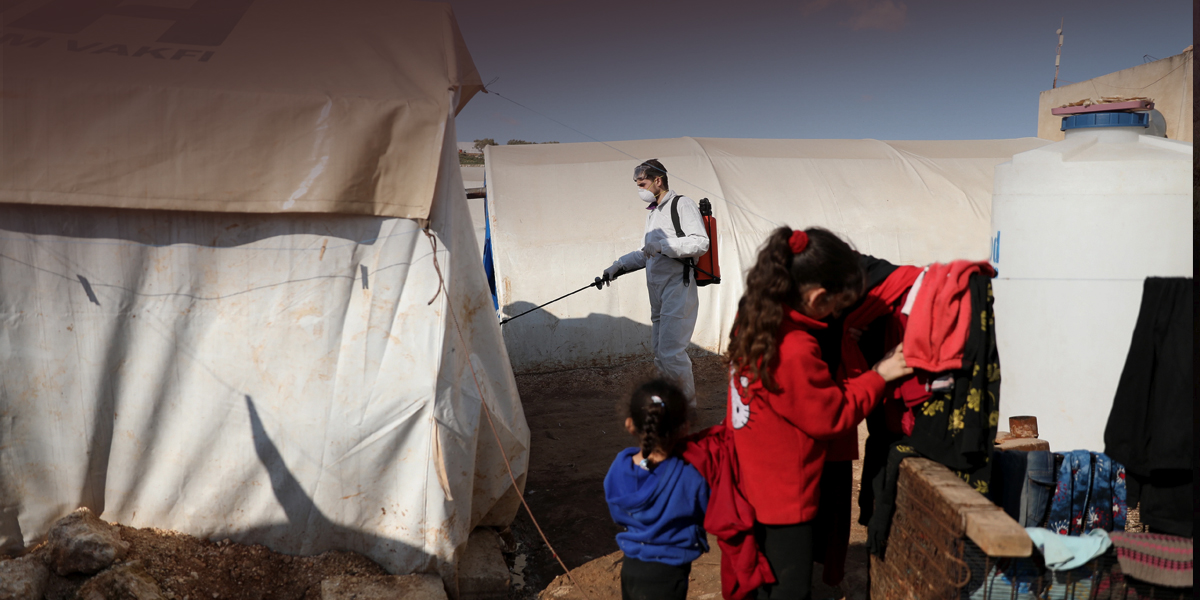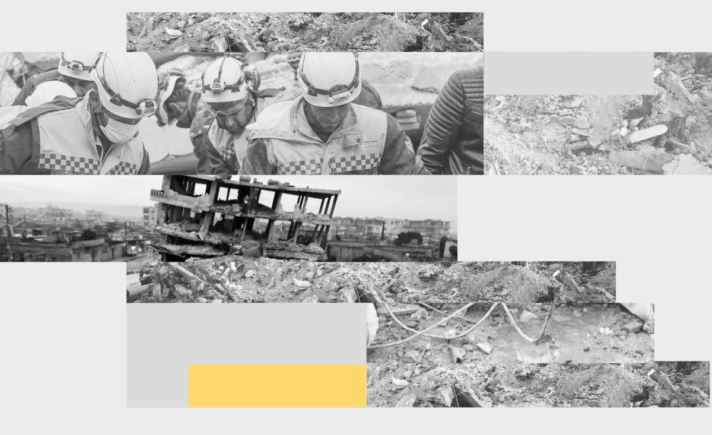“The northwest [of Syria] is not a country,” said a spokesman for the World Health Organization’s office in southern Turkey, in remarks to the New York Times intended to justify why the organization has so far only distributed Covid-19 test kits to parts of Syria controlled by the Assad regime. More than a month has passed since these kits were supplied to the ministry of health in Damascus, yet none have been sent to hospitals in Idlib—where three million civilians live in dire conditions—despite pledges that they would arrive last week.
Doctors and health workers in Idlib await this equipment to start testing patients with symptoms resembling those of Covid-19, the disease caused by infection with the novel Coronavirus. Despite some of these patients having already died, according to a medical source in Idlib, the delay in the delivery of test kits has prevented medical staff from confirming any diagnoses of the disease that has swept the world in recent weeks, spreading panic and bringing the health sectors of several developed countries to the brink of collapse.
In his statement to the New York Times, the WHO official, Hedinn Halldorsson, could say only that test kits would arrive “soon,” admitting “I don’t know the nitty-gritty details of it.” Of the lengthy delay in their arrival, he added, “When you consider the challenges, I think it’s quite reasonable.” Three test kits that finally did reach Idlib on Tuesday were obtained independently by a Syrian NGO, the Assistance Coordination Unit (ACU), at its own expense, with no contribution from the WHO.
More than four months on from the declaration of the outbreak in China, UN organizations seem to be making no real efforts to prevent the virus spreading in parts of Syria outside the regime’s control. These include Idlib Province, where around one million live in makeshift camps, or even out in the open air, lacking the most basic health provisions such as clean water, sanitation, and sewage networks. Add to this the dense overcrowding in these camps, and there is an almost total lack of protection against a pandemic.
Despite the creation of an emergency group that includes the WHO and various Syrian relief and medical organizations to confront the threat of the virus in the northwest of the country, the WHO’s contribution has gone no further than providing basic information about the virus; information already available to all. In other words, the local organizations working on the ground bear the burden of facing a potential new nightmare for Syria entirely on their own.
Halldorsson’s statement that Idlib was “not a country” was nothing new, neither rhetorically nor in terms of how the province has been dealt with in the past. Yet the fact this particular official is tasked specifically with providing for Idlib’s needs, per the articles of UN Security Council Resolution 2504 authorizing aid delivery across Syria’s northern border, means his words run completely against the purpose of his own mandate.
It’s true that Idlib isn’t a “country,” but it contains three million civilians who in recent years have been subjected to an all-out war of extermination and displacement by the Syrian regime and its allies. Idlib isn’t a country, but Halldorsson’s and other similar statements entirely contradict the principles of humanitarian action. This isn’t the first time the WHO has dealt with a dangerous pandemic in Syria in this way; NGOs had to get support from the Bill & Melinda Gates Foundation to fight a polio outbreak in Syria after cases were documented in 2013 and 2014. Once again, the WHO provided vaccines only to the Assad regime; the ACU had to procure them from elsewhere to confront what was at the time a serious epidemic.
The same is happening today with Coronavirus: the WHO is again late to act, despite Resolution 2504 allowing it to provide aid without the Assad regime’s permission, and despite the fact that international humanitarian law permits organizations to act to save civilian lives and deliver aid across borders.
The necessary legal framework has been put in place, yet Idlib remains invisible on the WHO’s map, which shows only “state” territory. Civilians in areas under military assault by this “state” can expect no assistance from the WHO. Halldorsson knows this well, as someone who worked for over two years at the UN’s Office for the Coordination of Humanitarian Affairs (OCHA) in Damascus before joining the WHO. He is perfectly aware the Assad regime won’t provide tests to Idlib’s hospitals; it seems it hasn’t even provided them to civilians in its own territory, amid reports that the cost of a single test may be as high as 300,000 Syrian pounds.
All parties involved—especially the UN and WHO—know that a Coronavirus pandemic in Idlib would lead to tens of thousands of deaths, if not more. Yet neither of these two bodies is taking any serious preventive measures or carrying out the work it was originally tasked to do. If the WHO does not recognize northwestern Syria, as its officials suggest, it would be better off closing its office, which spends hundreds of thousands of dollars not doing its job, while declaring to the press that it can’t be blamed, because northwestern Syria isn’t a country.
Idlib isn’t a country, indeed. Likewise, the World Health Organization isn’t a humanitarian organization, and perhaps the expertise of its employees would be put to better use in the “governmental health agencies” they speak of in their statements; statements which bear striking resemblance to those of “governmental agencies” in a “state” like Syria.
[Editor’s note: This article was originally published in Arabic on 24 March, 2020.]





